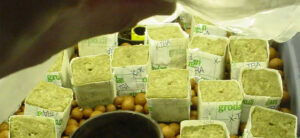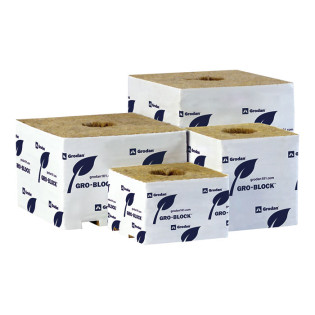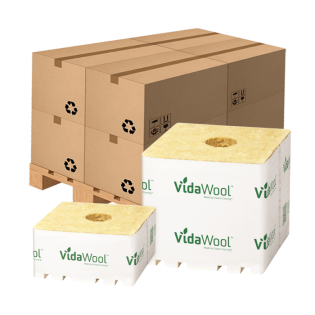
Aside from soil and coco, rockwool for plants is one of the most popular grow media out there. This unique media has a ton of benefits to offer those who grow with it, but some drawbacks as well.
In this article, we’ll teach you how to grow plants with rockwool, and how to properly dispose of it - something many growers are unaware of.
Before that, though, let’s start with some key information on rockwool as a substrate - what is it, and where does it come from?
What Is Rockwool For Plants?
Rockwool is a substrate many growers use in hydroponic operations, but it can be used to start seeds and clones as well.
It’s a man-made media, as it is formed when Basalt rock and chalk are melted together at extreme temperatures.
The result of this process is a substrate similar in texture and appearance to steel wool, with a dense structure consisting of long strands of fibers.
The process also results in a substrate that is entirely inert! This means the media provides absolutely no nutrient charge - the ppm or ec content is zero. This is actually one of the benefits to growing plants in rockwool, which we’ll cover shortly.
What Are The Different Types Of Rockwool For Plants?
One of the great things about growing plants in rockwool is that this media comes in so many different shapes and sizes.
It can be used to grow plants to maturation, or simply to start seeds and clones.
The most popular form of rockwool are cubes or blocks, but mats, starter plugs, slabs, are all available as well. Here are all the forms of rockwool for plants we carry here at Hydrobuilder:
We also carry Block Covers for your rockwool, to help with insulation and retention.
Rockwool can also be used for insulation in construction, so if you search the internet for just “rockwool”, you may end up getting some confusing resources.
Don’t worry, though, as you’ll learn everything you need to know about rockwool on this page! Now, let’s get into the benefits of growing plants in rockwool.
Benefits Of Rockwool For Plants
As we touched on before, the biggest benefit of growing plants in rockwool substrate is the inert feature. This means you are in complete control of the nutrients your plants receive.
You can dial in your feeding regimen, and won’t have to deal with any of the weird irregularities that can arise when growing in soil.
Another notable benefit of growing plants in rockwool is the versatility. Not only does this substrate come in an abundance of sizes and forms, but it can be transplanted into other media.
This means you can start seeds in a rockwool starter cube, and when the seedling starts taking off, this plug can be transplanted directly into a pot of soil or a hydro system.
OR, you can transplant this seedling into a larger rockwool block, and keep growing!
How To Grow With Rockwool For Plants
Growing with rockwool can be pretty simple, but there are a few things you need to know about. It’s important to wear PPE, and properly prepare your rockwool cubes.
Always wear PPE when handling rockwool
Before you even open your package of rockwool, put on gloves, and potentially eyewear if you have it.
The fibers that make up your rockwool can be incredibly agitating to your eyes, skin, and especially your lungs.
So always protect yourself when handling rockwool, and be sure you don’t inhale any dust or fibers!
Start by soaking the cubes
Rockwool is incredibly dry out of the package. Your first task when growing with rockwool is to saturate the cube with water, so your plants have ample access to moisture.
Before you go crazy submerging your cubes, however, there are some technicalities you need to know about.
You want these saturated with water, not soaked. Best practice is to soak them, but then shake excess water from them. This will ensure there is plenty of moisture within the fibers, but you won’t drown your young plants.
By no means should you squeeze rockwool like a sponge. Squeezing the cubes too hard can really mess up the internal structure of these cubes, and decrease the overall effectiveness of them.
Due to the standard pH of these cubes, you need to make sure you are saturating in pH’d water. Let’s talk about that real quick.
Adjust the pH of rockwool cubes
Because rockwool cubes have a naturally high pH, you need to adjust it down to the suitable level for plants.
Typically, the pH of rockwool is around 8. You should lower this to a more acidic range for healthy plant growth - between 5-6.
This can be accomplished by saturating your cubes in water pH’d to this level. Be sure you pH your additional waterings or feedings going forward, as well. Otherwise, you’ll end up locking out certain plant nutrients and deficiencies/toxicities can arise.
How to properly dispose of rockwool
Rockwool is not organic, so dispose of it properly. Because it will never break down, it shouldn’t be thrown in the garbage where it can go pollute a landfill.
Instead, you should break it down into tiny pieces and scatter it throughout your garden. This will help with water retention, and won’t harm your plants in any way.
Recycling your rockwool like this is the best way to dispose of it, while gaining benefits in your garden!
Final thoughts on rockwool for plants
Now that you know everything you need to about rockwool for plants, you can get started growing with it!
Here at Hydrobuilder, we carry the widest selection of rockwool brands at the best prices online. Better yet, you’ll get to experience our world class service.
Whether you want rockwool cubes, slabs, or any other form, you’re guaranteed to find it here. Head over to the site and grab yours!




































